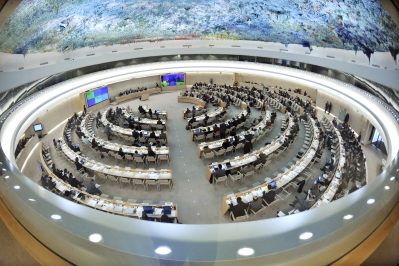25 March 2015
To: Member and Observer States of the UN Human Rights Council
Open Letter: Draft resolution on Effects of Terrorism on the Enjoyment of Human Rights
Your Excellency
The undersigned civil society organisations urge your delegation not to support the draft resolution on the ‘Effects of Terrorism on the Enjoyment of Human Rights’ in its present form and without substantial amendment.
In our view, the text, presented jointly by Egypt, Jordan, Algeria, Morocco and Saudi Arabia, is significantly unbalanced and suffers from four key and inter-related deficiencies.
First, the draft text calls on States to strengthen national laws, mechanisms and measures to criminalise and counter terrorism (see, eg, OPs 5, 6, 7 and 8) without any recognition in the operative paragraphs that such laws and measures must be in conformity with international human rights law, international humanitarian law and refugee law, as provided for in such consensus resolutions as HRC Res 25/7 (OP 1) and HRC Res 22/6 (OP 10). We consider that support for the draft text in its present form would be incompatible with, and may undermine, those important consensus resolutions.
Second, the draft text fails to call on States to ensure that laws and measures on counter-terrorism and national security do not hinder the work and safety of human rights defenders and other civil society actors (see, eg, HRC Res 22/6 OP 10(a)). It also fails to call on States to ensure that such laws and measures clearly identify which offences qualify as terrorist acts by defining transparent and foreseeable criteria, including those formulated by the Special Rapporteur on the promotion and protection of human rights while countering terrorism (see, eg, HRC Res 22/6 OP 10(b)). These weaknesses should be seen in the context of an increasing number of States from all regions using and misusing overbroad and vague legislative provisions to restrict and criminalise the exercise of the rights to freedom of expression, association and assembly, to target and endanger the work and safety of human rights defenders, and to inhibit the access of non-governmental organisations to foreign funds, all contrary to international human rights laws (see, eg, HRC Res 22/6 PP 13 and HRC Res 27/31 PP 8).
Third, the text fails to recognise that support for a vibrant and pluralistic civil society and respect for the fundamental rights of freedom of expression, association and assembly are essential to combat extremism, counter terrorism and provide protection, support and justice to victims. As the High Commissioner articulated in the introduction to his annual report at this session of the Council, ‘terrorist attacks cannot destroy the values on which our societies are grounded – but laws and policies can. Measures that build what has been termed the “national security state” – such as arbitrary or prolonged detention; torture and ill-treatment; massive surveillance that contravenes the right to privacy; unfair trials; discriminatory policing; and the abusive use of legislation to curb legitimate rights to peaceful protest and to freedom of expression – are human rights violations. They generate legitimate resentment, harm social cohesion, and undermine the essential values of the international community.’
Fourth, while the draft resolution has been presented by the core group as taking a ‘victim-centered’ approach, the text fails to respond to what victims of terrorism have themselves expressed to the Council is needed to respect and fulfill their human rights. In this regard we recall that the Council received the views of victims of terrorism through a Panel on the topic in 2011 (see A/HRC/19/38, 7 December 2011), and via a report from the Special Rapporteur on human rights and counter terrorism, Ben Emmerson, setting out his proposed framework principles in 2012 (see A/HRC/20/14, 4 June 2012). This draft resolution, including OPs 12 and 13, fails to sufficiently engage with the views conveyed to the Council by both the victims and the Special Rapporteur. To the contrary, the resolution appears to continue the regrettable practice of invoking the suffering victims of terrorism to justify measures that too often are abused to violate human rights, without delivering real justice, remedy, and support to the victims themselves.
In conclusion, we urge your delegation not to support the draft text without very substantial amendments, as proposed above. Indeed, in light of the significant deficiencies identified, a preferable approach may be to consider the concerns sought to be addressed in the present text when the Council comes to negotiate its traditional bi-annual resolution on human rights and countering terrorism at its 31st session in March 2016.
Yours sincerely
African Centre for Democracy and Human Rights
Amnesty International
ARTICLE 19
Asian Legal Resource Centre
Cairo Institute for Human Rights Studies
Centro de Estudios Legales y Sociales (CELS)
East and Horn of Africa Human Rights Defenders Project
Egyptian Initiative for Personal Rights
FORUM-ASIA
Human Rights House Foundation
Human Rights Watch
International Commission of Jurists
International Federation for Human Rights (FIDH)
International Service for Human Rights



